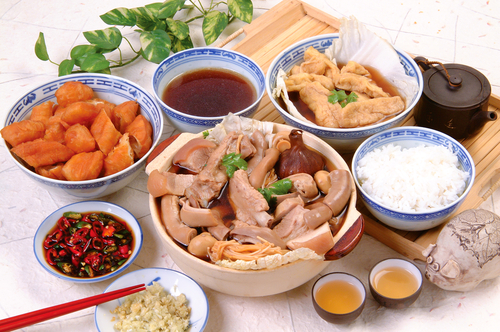
This is Daddy’s first post … got to share this because some people believed too strongly in confinement myths to the extent of making it a hell month for the mother. Well, not in my house! My wife shall be allowed to make her own informed decision about the “rules” of confinement.
In TCM, a woman loses large amounts of Qi and blood during childbirth, putting her body in a “cold” phase. This is why Chinese culture recommends a month-long period of “confinement” for the new mother. These weeks of rest and a modified diet are intended to restore the mother’s balance and return her to full health.
While certain confinement practices are common, it’s a bad idea to follow them blindly. Discover the truth behind the myths from a TCM perspective.
Myth: Do not drink plain water
This comes from the belief that drinking plain water causes water retention or will cool down the body too much.
The truth: There is no harm in drinking plain water. In fact, because new mothers tend to sweat heavily because of hormonal changes, they have all the more reason to drink water and keep hydrated. However, new mothers should be encouraged to drink warm water instead of cold water.
Myth: Consume alcohol
Drinking alcoholic beverages or eating dishes cooked with alcohol is thought to boost blood circulation and warm up the body.
The truth: It is correct that alcohol is used in TCM to expel cold and promote circulation. That said, new mothers should not regard alcohol as essential to their recovery. In fact, nursing mothers should avoid alcohol, since it can be passed on to their baby through breast milk.
Myth: Do not shower or wash one’s hair
Contact with water is thought to cause “wind” to enter the body and lead to headaches and rheumatism later in life. This taboo may have originated from northern China of the past. Since water quickly became freezing because of the cold weather, it was easy to catch a chill from bathing.
The truth: It is perfectly fine to continue one’s bathing habits. Besides maintaining personal comfort, regular bathing helps prevent skin and wound infections. However, the mother should not bathe with cold water. She should also dry her body immediately after bathing to prevent exposure to cold air.
Myth: Consume plenty of herbal supplements
Since childbirth drains a woman of Qi, it is recommended that she stock up on specific herbal soups and dishes that boost energy and blood.
The truth: Since every woman’s health profile is different, she may not benefit from the same remedies that help others. It is better to consult a qualified TCM physician for personalised advice and treatment.
That said, one dietary recommendation can be generalised to all new mothers. In TCM, it is best to avoid cooling foods during confinement. Eating such foods carry a risk of harming one’s Spleen and Stomach and hampering recovery. Foods to avoid include bamboo shoots, bananas, crabs and oysters.
Myth: Do not read or cry
Childbirth is thought to weaken the Liver, which is linked to the eyes. Therefore, one should avoid putting stress on the eyes by reading or crying. Otherwise, one might experience eye problems later in life.
The truth:There is no basis for the belief that reading or crying would lead to eye problems. However, TCM experts do hold that the large loss of blood during childbirth may weaken the eyes. This is because blood is related to the Liver, which is associated with the eyes. Regular consumption of Liver-protecting foods, such as Chinese Wolfberries, would help maintain eye health.
Myth: Wear warm clothing and do not use fans and air-conditioning
As with bathing, any exposure to cool air is said to cause “wind” to enter the body and lead to health problems later in life.
The truth: The key here is moderation. The new mother should do what makes her comfortable. In a hot and humid climate, fans and air conditioners may even be essential for preventing heat rash. However, the new mother should not let the fan or air-conditioner blow directly on her